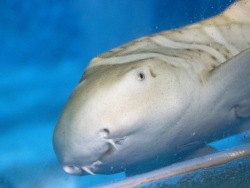How sharks grow up

Alpha — the first zebra shark born in Russia — has turned one year old! The pup has quadrupled her hatching length of 27 cm to a length of 120 cm and reached almost 50 times her hatching weight of 110 grams — now she weighs 5 kg.
While observing the shark pup’s development, Aquarium biologists had access to research material unique to Russia. Constant monitoring of Alpha’s growth and feeding rates and preferences enabled the aquarists not only to adjust the diet of the baby predator in due time but also to draw up guidelines on raising sharks for future breeding programs for rare species.
“In her first two months of life, Alpha grew unevenly: she increased in length, without gaining weight, or put on some grams of weight, with her length remaining the same,” said one of Alpha’s caretakers, Artyom Novikov, Lead Specialist at the Department of Tropical Marine Species. “Then increases in her weight and length got synchronized. At first, we measured the pup’s weight and length every ten days and then once a month. Now the baby shark is quite large, and weighing requires preparatory measures.”
At hatching, Alpha had a contrasting black and white, zebra-like pattern, but as she is getting older, the previously bright bands across her body are fading away, being replaced with spots. Today the shark pup bears a much stronger resemblance to her parents than a year ago: the skin that feels like fine sandpaper has become lighter, and her belly is completely white.
After her first birthday, Alpha started a new chapter in her life: the yearling predator was relocated to the largest, 200-ton, tank of the Science and Acclimation Building. Here Alpha discovered a new reality: up to then the young zebra shark had seen only humans, and at that point she learned that there were some other marine animals in the world. Currently the pup shares the tank with individuals of several ray species — honeycomb stingray, round ribbontail ray, whitespotted eagle ray and flapnose ray.
“We have put Alpha into a special net cage inside the tank where she will spend a week or two,” said Natalya Gireva, Head of the Department of Tropical Marine Species. “She has to acclimate to a new place, new water conditions and scents, and, of course, to the fact that other animals live near her.”
The shark pup will also have to become accustomed to a new feeding schedule and technique. Alpha will be offered lunch at the same time as the other tank residents, and in addition, she will soon be switched from feeding with tongs to hand feeding. Just like the other large predatory fish at the Aquarium, the young zebra shark will receive food from the hands of scuba diving biologists.